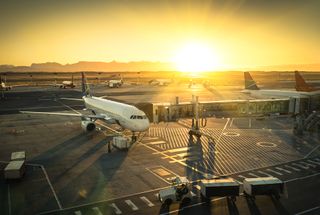UK commits £1.8m to boosting airport security with AI
Eight projects have been selected to trial cutting-edge technology over the next 12 months

The UK government has sunk 1.8 million into the development of cutting-edge artificial intelligence (AI) to bolster security and help alleviate wait times at some of the country's busiest airports.
Eight projects have been chosen to trial technology that the government hopes will help bridge the gap between maintaining robust security measures and offering a quick and easy-to-use service for passengers.
Security Screening Technologies, a small research team based in Derbyshire, has been given the nod to test an AI system that's been trained to identify suspicious objects in footwear, including explosives. If successful, the technology would mean passengers would no longer be required to take their shoes off during pre-flight security checks.
A sophisticated scanning system is also being developed by Sequestim, a small team based in Wales, that promises to provide a way for security staff to scan passengers as they pass through security gates without the need to take off outer clothing.
Sequestim's highly sensitive camera is able to detect a person's natural radiation and convert the data into an image, at which point it uses machine learning to accurately assess whether the individual is carrying a potentially harmful device.
"This latest 1.8 million of funding invests in innovative projects that will ensure we are continuing to capitalise on pioneering research," said aviation minister Baroness Sugg. "The aim is to have a safer and smoother travel experience for air passengers.
"We have a proud history of the early adoption and use of cutting-edge technology and this programme is helping to ensure we continue to lead the way in airport security."
Get the ITPro. daily newsletter
Receive our latest news, industry updates, featured resources and more. Sign up today to receive our FREE report on AI cyber crime & security - newly updated for 2024.
The eight winning projects have 12 months to trial their proposed solutions, which include the use of electromagnetic imaging cameras to detect objects inside luggage, the collection of gas samples from cargo to check for explosives, and the application of AI to perform many of the tasks currently performed manually, such as humans analysing scan results for potential threats.
The funding has been offered as part of a 5-year Future Aviation Security Solutions (FASS) programme, a joint initiative between the Department of Transport and the Home Office that seeks to modernise airport security with products at the cutting-edge.
Although the initial 1.8 million to allow for the testing of the technology, there's no indication as to how much it will cost to implement security upgrades across the UK, or which airports would eventually receive the kit.
X-ray-like CT scanners, similar to those found in hospitals, have been trialled across Europe and the US, however, adoption has been slow given the $300,000 price tag for an individual scanner.
The programme comes four months after a USB containing 2.5GB of classified information on Heathrow Airport security protocols was found discarded on a street.
Dale Walker is the Managing Editor of ITPro, and its sibling sites CloudPro and ChannelPro. Dale has a keen interest in IT regulations, data protection, and cyber security. He spent a number of years reporting for ITPro from numerous domestic and international events, including IBM, Red Hat, Google, and has been a regular reporter for Microsoft's various yearly showcases, including Ignite.





